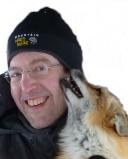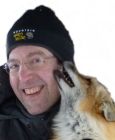Embarrassment
Why Lady Brewster Fainted in 1860
Thomas Henry Huxley, Bishop Wilberforce, and why Lady Brewster fainted.
Posted March 5, 2012
Why Lady Brewster Fainted in Shock
In my last blog—"Of Davy Jones and Thomas Henry Huxley"—I noted the lessons each taught, and ended with, "I have written much on Huxley, and he remains an intellectual of hero of mine. But now, for a moment, it is time to say, peace Davy Jones, and thanks for everything." Now, I'd like to share my favorite, and probably the most famous, Thomas Henry Huxley story.
In the summer of 1860, after Darwin's The Origin of Species had only been out for six months, the war of words between clergy and scientists over nature and man's place in it, had already heated up. This war had its equivalent of the Battle of Gettysburg on June 30, 1860 at the annual meeting of the British Association for the Advancement of Science (BAAS). The BAAS meeting had a discussion of Darwin's dangerous new ideas as its centerpiece. Darwin's writings on evolution and natural selection meant many things to many people, but they undeniably meant one thing if correct—all life on earth, including human life, evolved to its current state, and was not the product of special creations by a Creator.
The audience of 700 in place for the Saturday, June 30 session of the 1860 BAAS meeting was made up of a majority of clergyman, some academics, and a fair share of British ladies and gentlemen. What made the crowd so unusual was not the low count of academics, but rather the predominance of clergy over ladies and gents. Normally, the British upper class dominated the audience in these meetings, viewing such events as the Romans viewed gladiator fights. Clerics often attended the BAAS meetings, but here they dominated. They came to hear the legendary Reverend Samuel Wilberforce—also known as Samuel of Oxford—dismantle evolution, and show, once and for all, how dangerous, misguided, and flat- out wrong Darwin and his supporters were. Wilberforce's opponent was to be the world-class scientist and public speaker, Thomas Henry Huxley.
So many people came to hear Wilberforce and Huxley at Oxford that Saturday in 1860 that the meeting organizers had to switch rooms to the new Gothic Revival Museum, a room, that by a strange twist of fate, had an entrance with a guardian angel atop it. In the middle of this jam-packed room sat Professor Henslow, president of that section of BAAS. On his right sat Bishop Wilberforce and on his left sat Huxley. The clerics in the audience sat front and center. In the Northwest corner sat undergraduates and a few professors to cheer on Huxley. The rest of the room was lined with British ladies and gentlemen itching to hear a good fight.
When the purple-vested, 55-year-old Reverend Wilberforce took center stage to speak, he had been Bishop of Oxford for 20 years and had significant ecclesiastical might behind him in his battle with Huxley. Still, Wilberforce had no academic pedigree to challenge Huxley, aside from a long-ago received Oxford Award in mathematics. What he did have on this front, however, was a secret weapon named Richard Owens. Owens, the world's leading anatomist, and Darwin's arch scientific rival, had been coaching Wilberforce for his BAAS performance.
Wilberforce attacked Darwin's theory of evolution by natural selection, which was in Wilberforce's view, little more than a poorly formed, sacrilegious principle that threatened mankind's place as the crowing jewel of creation. Wilberforce ended with words, that in retrospect, he would regret. He turned to Huxley and asked him, "Was it through his grandfather or his grandmother that he claimed his descent from a monkey?"(Life and Letters of Thomas Henry Huxley F.R.S. (1900) edited by Leonard Huxley). The crowd went wild with glee.
Even though Huxley knew that Wilberforce was going to try to discredit Darwin's ideas, he actually had no intention of attending the meeting the day Wilberforce was to speak, despite the fact he was one of the most prominent scientists at BAAS. Huxley was exhausted and had planned to leave Oxford just before Wilberforce's talk to join his wife, who was visiting her sister in Reading. But, in a bit of serendipity, he bumped into Robert Chambers at BAAS that Friday. Some 15 years earlier, Chambers, using a pen name, wrote Vestiges of the Natural History of Creation, an evolutionary book, that though misguided, was a sort of precursor to The Origin of Species. Chambers, perhaps in an attempt to get even with the clergy that panned his book, begged Huxley to speak and Huxley agreed to stay on to face Wilberforce the next day.
Huxley began his reply by stressing that he was only present "in the interests of science" and then proceeded to show that Wilberforce's arguments were flawed, and not based on any scientific principles whatsoever. What was to follow would shock the audience, for now Huxley would respond to Wilberforce's sarcastic remark regarding Huxley's familial descent from monkeys. As a writer present at the debate wrote for Macmillan's Magazine many years after the 1860 meeting, "Mr. Huxley...spoke those tremendous words—words which no one seems sure of now, nor, I think could remember just after they were spoken, for their meaning took away our breath, though it left no doubt as to what it was."
According to the Macmillan's Magazine writer, Huxley replied to Bishop Wiberforce's question about grandparents and monkeys by noting "as to the descent from a monkey, I should feel it no shame to have risen from such an origin. But I should feel it a shame to have sprung from one who prostituted the gifts of culture and of eloquence to the service of prejudice and of falsehood." Another spectator at the BAAS meeting remembers it differently, and thought Huxley had said, "I would rather be the offspring of two apes than be a man and afraid to face the truth."
The audience was stunned. One woman, Lady Brewster, fainted in shock. Subsequent to Huxley's remarks, a few other well-known British scientists stepped up to defend Darwin's ideas, at which point the meeting ended.
I wish I could have been there to shake Huxley's hand. And come to think of it, I'd also like to have bought Robert Chambers a pint for prodding Professor Huxley into not catching that train, and instead remaining at that BAAS meeting to begin with.




